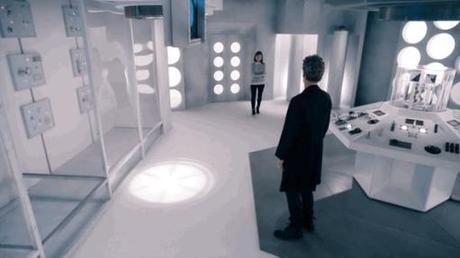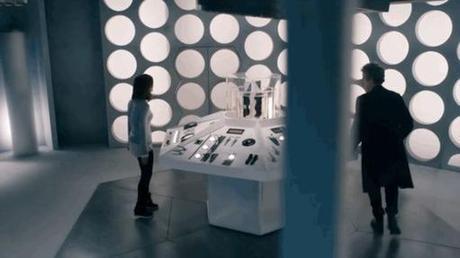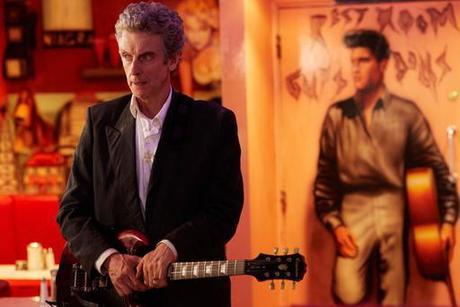Spoilers for Doctor Who’s season 4 and season 9 finales below.
In 2008, I watched in horror as Donna Noble begged The Doctor to stop. A character whose bark and bluster hid a crippling lack of self-confidence had finally become the best possible version of herself, her life forever changed by her travels with The Doctor. However, she’d traveled a little too close to the sun, so to speak, and now she was dying, her human body incapable of containing the Time Lord energy coursing through her veins. She had become The Doctor-Donna, a human-Time Lord hybrid, and it was going to kill her. Because she now had the intelligence of The Doctor she was fully aware of how impossible she was, yet she didn’t want to go back to just being Donna Noble. She didn’t want to be the woman who never realized her full potential. Her past was her own, and to take that away from her would be a crime, regardless of whether or not it meant saving her life. She begged the Doctor not to do what he intended, which was to save her life by erasing her memories of him and reverting her back to being a mere human. He did it anyway, even as she screamed, “No, no, no. Please. No. No!”
On paper, this scenario is creepily close to rape, right down to the way the Doctor’s method of erasing Donna’s memories involves him forcibly placing his hands on her. That’s not why I was horrified the first time I watched it, though. I was horrified because I was wrapped up in the story, and I understood the heartbreaking tragedy at play. Doctor Who was killing off one of its companions, just not officially. Donna would live, but the woman she had become was more or less being killed. The only people who would know would be The Doctor and Donna’s grandfather and mother, the latter of whom openly chafes when The Doctor points out that maybe Donna would have had better self-confidence in the first place if she’d had a more loving, re-assuring maternal figure in her life. The Doctor says goodbye to a version of Donna who views him as a complete stranger, and he returns to the Tardis to lean next to the central console and look very defeated, David Tennant flashing his big, sad eyes like only he can.
I didn’t think to frame it as rape. I didn’t think to accuse the showrunner Russel T. Davies of misogyny or criticize his treatment of female characters. I didn’t take offense to a story twist which took the choice away from the show’s only female character. I simply accepted the story on its own terms. Donna was going to die! What the hell else was The Doctor supposed to do? Plus, I didn’t watch the show for Donna; I watched it for David Tennant’s Doctor, and I got an odd thrill from seeing him put through the emotional wringer. I was devastated to see him denied happiness yet again. He’d lost the love of his life (Rose) and now his best friend (Donna). That poor, poor man. Quick. Someone give him a hug.
Then last night I watched Doctor Who’s season 9 finale, “Hell Bent,” which masterfully presents a kind of inverted version of the same scenario with the Doctor and Donna, except this time it’s the Peter Capaldi Doctor and Jenna Coleman’s Clara, who has already died. The Doctor’s grief over her death was such that he spent four and half billion years in a Time Lord torture chamber. They thought he had information about the prophecy of a Dalek/Time Lord hybrid which would be the death of them all, and the torture chamber was their way to get the truth out of him. He didn’t actually have the answers they were looking for, but he played the long con, enduring those years of torture to further convince the Time Lords that he must know something he wasn’t willing to admit. Clever boy.
Once he literally punched his way out of the chamber, he could leverage his war hero status into seizing control of the Gallifreyan government and quickly despose of potential rivals, the Gallivreyan President and the High Council. Then he could convince the Time Lords to extract Clara from her original timestream in-between her final heartbeats, under the ruse that she could offer some much needed answers about the hybrid. She’s sort of like a zombie in that state, in every way looking like normal Clara except for the fact that she doesn’t have a pulse and is more or less the walking dead. In fact, this whole time The Doctor’s plan was all leading up to this moment: tricking the Time Lords into using their technology to briefly save Clara so that the he could then run away with her in a stolen Tardis. If that means openly punching a fellow Time Lord and then firing a gun square at their chest, forcing a regeneration, then so be it, regardless of how un-Doctor-like both of those actions are.

However, in Clara’s final moments she made her peace with her own death and ordered the Doctor to accept it and not lash out. Once pulled from her timestream and made aware of the Doctor’s intentions to save her regardless of consequences she forcefully reminds the Doctor that she didn’t want this.
That matters not – the Doctor makes the decisions here. His plan hits an inevitable snag when simply taking Clara as far away from Gallifrey as possible fails to restore her pulse. The timeline is not re-setting, as he had hoped. She still has to die. The Time Lords will not stop trying to hunt her down and place her back in her timestream so that she can face the Raven. But what if the Doctor erases her memories like he did with Donna? The Time Lords might not be able to track Clara down if she’s just living a normal life somewhere in the galaxy, completely oblivious to her past as The Impossible Girl.
But, wait, since she’s not even technically breathing and lacks a heartbeat wouldn’t she be exposed the first time she has a routine physical or goes to a medical doctor for anything? And in her zombie-like state will she even age?
Um, shut up about that. The point is the Doctor is again presented with a scenario in which saving a companion’s life means making a choice for them. He erased Donna’s memories. He once tried to drop Amy and Rory off and end his open-Tardis door policy with them even though they weren’t ready to stop traveling with him. However, when the time truly came for Amy to leave she made her own choice (to be with Rory), ignoring the Doctor’s desperate pleas for her to simply run away with him, and when the Doctor tried to employ his patriarchical act on Clara she was having none of it.

It’s a criticism which Moffat, by his own admission, is sympathetic to, recently telling The Radio Times, “The general point being made by these people is correct. We need better female role models and representation on screen. We need all of that.” However, he think the show is sometimes unfairly singled out, “It’s important to me that the little girls watching see Amy or Clara or Rose and want to be like them. People object and say you’re turning it into The Clara Show but that’s always been the case from the beginning. The Doctor’s always been a co-lead. He’s the hero figure but he’s not any more than a co-lead.”
Steven Moffat is the one who made it official that the Doctor can change genders via regeneration. He took it even further in “Hell Bent” by giving us our first on-screen depiction of male Time Lord regenerating into a female. Steven Moffat is the one who created River Song and Amy Pond. He’s the one who turned The Master into Missy, so beautifully and infectiously realized by Michelle Gomez. He’s the one who focused so much of season 8 on Clara that people actually complained. Jenna Coleman was originally scheduled to leave the show at the end of that season, but after the material Moffat was giving her who could blame her for wanting to stick around for the Christmas special and another full season. That whiplash might have resulted in Moffat somewhat backburnering Clara this season and mishandling her, as convincingly io9 argued, but a more charitable reading would be that season 8 was about Clara and season 9 was about the Doctor. The season 9 finale was about both of them, and it more than makes up for any missteps along the way.

The Doctor plays Murray Gold’s “Clara Theme” on his guitar, a nice touch
The entire finale was framed around The Doctor talking to someone who looks like Clara, working as a waitress in that Nevada diner from “The Impossible Astronaut.” She doesn’t appear to know him, but he seems to know her. It’s a familiar dynamic because we’ve seen it play out with The Doctor and Donna. Clearly, he succeeded in erasing Clara’s memories, and is now torturing himself by having one last conversation with her.
Ready your pitchforks, Moffat haters. Clara is yet another victim on the mainspain express.
But, wait, what’s this? Our assumptions were wrong this entire time. That actually is Clara in the diner, but she still has all of her memories. It is the Doctor who’s had his mind wiped, as part of a compromise he reached with Clara where they’d each touch his neural device and, like a toss of a coin, take their chances as to whose memories would end up being erased. Everything he’s told her as the default narrator of the episode has been his effort to fill the holes in his memory. He mostly has the facts right, but he doesn’t remember any of it. He’s positive he’d recognize Clara if he managed to meet her again, but he says that unaware he’s talking to Clara. Then the diner disappears, revealing it was actually the setting Clara and Ashildr (Maisie Williams) had programmed into their Tardis’ chameleon circuit.

Does this feminist inversion absolve Steven Moffat of all his sins? That depends on whether or not you think his sins are actually real or incorrectly perceived. As Charlie Jane Anders capably argued at io9, season 9 had its issues, and it’s debatable as to whether or not the entire hybrid storyline amounted to much. Heck, it’s debatable as to whether or not “Hell Bent” even answered the question of who the hybrid really was. However, that ending is so amazing it should forgive everything.
Or at least I think so. What about you?

